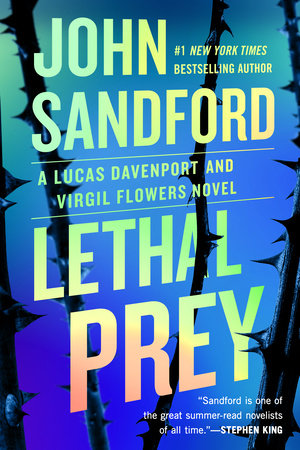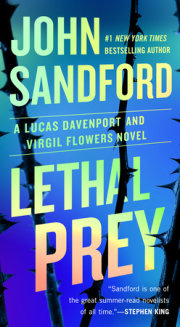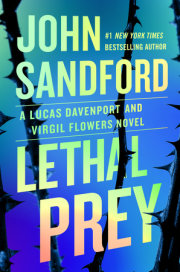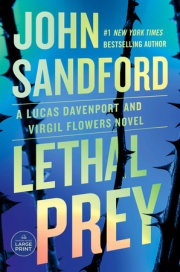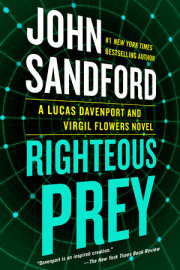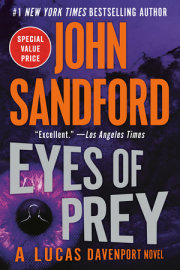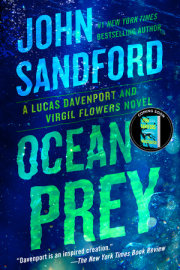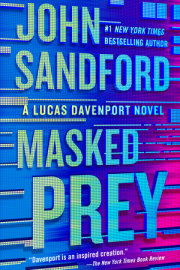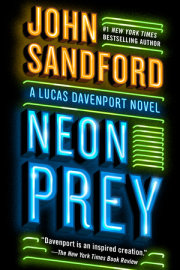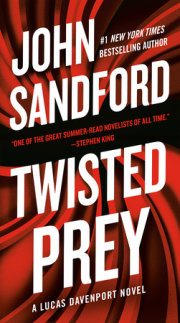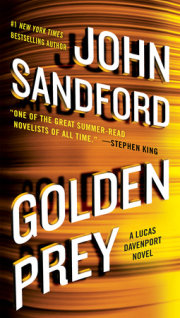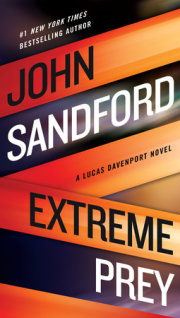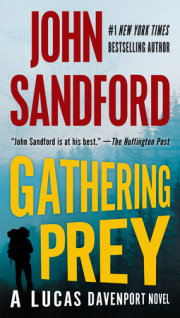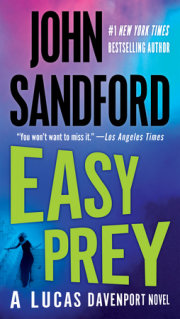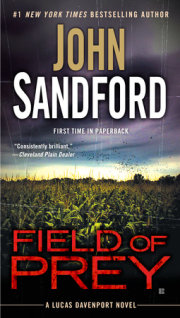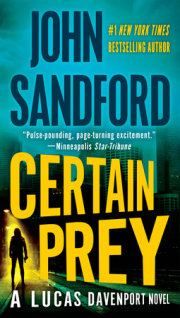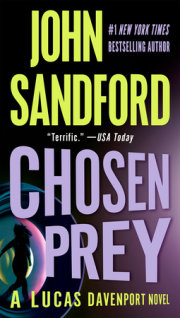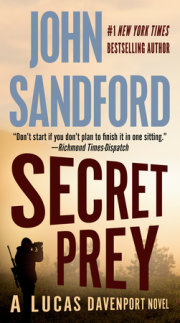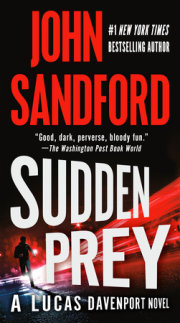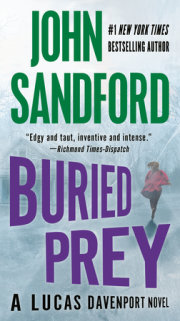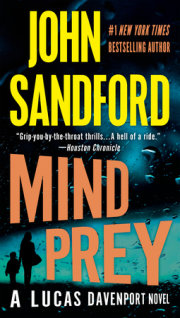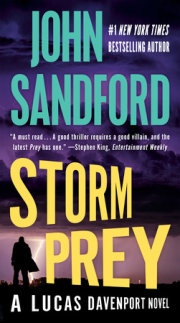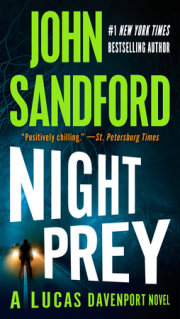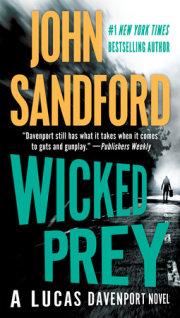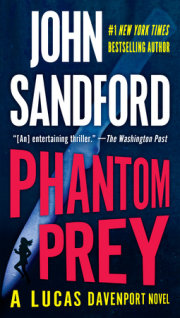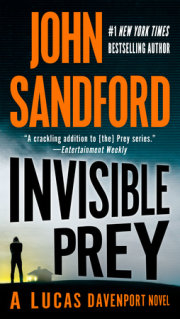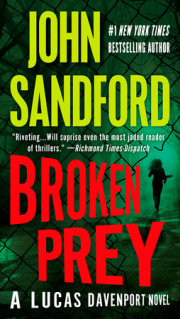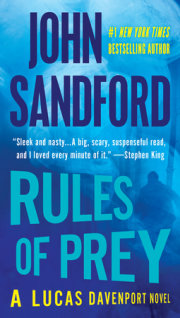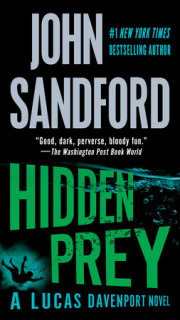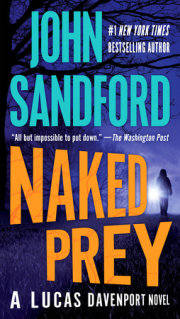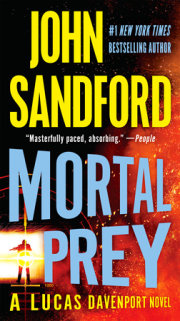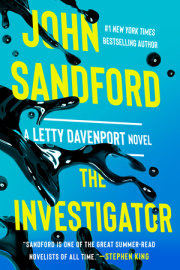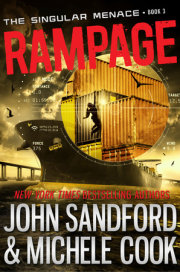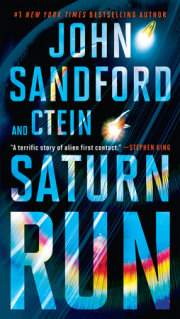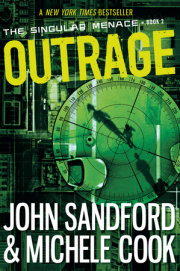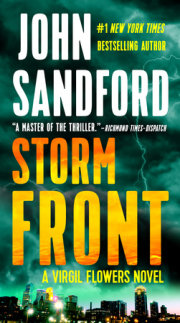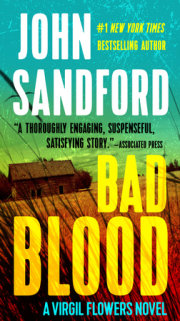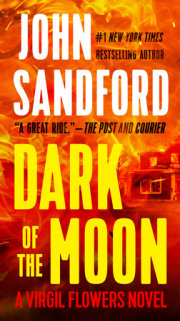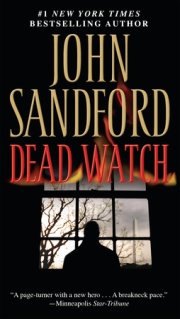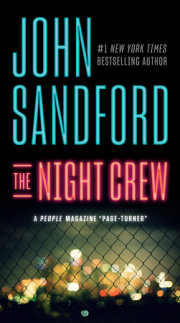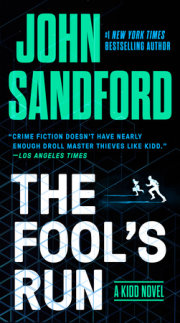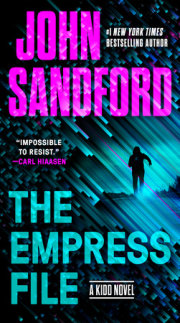1
Back in the Day-2003
Nine o'clock, a dazzling moon outside the window, a shrill whistle for a werewolf.
Amanda Fisk stood by the door, listening, teeth bared. There was no doubt about it: the little bitch was getting it on with Timothy.
She had tracked Timothy from his apartment-his ex had gotten the house-across St. Paul and downtown, right to Bee. She'd seen the blonde open the door, and her arms going up around Timothy's neck.
They'd disappeared back toward the stairway. She'd given them some time, and followed, using her own key to get in the building.
Now, with her mind clear and hard as a diamond, Fisk walked down to the cafeteria and through to the executive dining room. She felt as though she had a hand in her back, pushing her along. She got a knife from the serving cart, and as she was walking out, noticed the box of kitchen gloves. She took two, pulled them on, and continued back to her small office. As she walked, she got a whiff of . . . buttered popcorn? Was there somebody else in the building, somebody she didn't know about?
She didn't think so, but she did a swift recon, looking for light, movement, sound. Nothing. She went back to her office. Smelled the popcorn again. Couldn't find the source, but it seemed to be lingering around an unoccupied copy room. Didn't actually worry her, but it seemed curious.
She continued on. She had no plan, but then, as a law school graduate, she understood both the merits of meticulous planning and the merits of spontaneity. This was time for the latter; that was demonstrated by the serendipitous discovery of the nonslip latex gloves.
In her office, she locked the door, sat in her office chair in the semi-dark, and tested the point of the knife. As expected, the knife was dull. No matter, she had the time. The ledge under the windowsill was rough red brick, and, whetting rapidly and with anger, she groomed the table knife to a fine murderous point.
And she calculated.
The lovebirds would not be leaving together. Timothy Carlson had arrived in his Porsche 911, and the bitch had her Subaru in the parking lot. When the knife was ready, Fisk walked back to the VP's outer office, where the pair had gone to use the soft leather couch. She waited two spaces down, inside an unlocked conference room, the door cracked open just enough to see. The anger clawed at her throat, and she struggled to control her breathing. Timothy didn't know it yet, but she was already planning the wedding. They'd been dating for a year, and an idiot blonde named Doris wasn't going to sidetrack her plans.
There in the conference room, she didn't have to wait long. With Timothy, unfortunately, you never had to wait long.
And Timothy, laughing, possibly a bit abashed, as he should be, left first, checked his fly, said goodbye through the open doorway one last time. He walked along the dark corridor to the stairs, down the stairs, and out.
Doris Grandfelt stepped out two or three minutes later, peered nearsightedly around, and then, barefoot and bare-assed, carrying her underpants, skirt, shoes, a shoulder bag, and what appeared to be a handful of Kleenex, scurried down the hallway to the ladies’ room.
Fisk followed, her senses tuned to any possible interference or interruption, but the building, except for the two of them, and the scent of buttered popcorn, was empty. The knife was light in her hand, ready.
She stopped outside the restroom, kicked off her shoes, listening, then pulled open the door and peeked. Grandfelt was in one of the toilet stalls. Fisk stepped inside, eased the door shut, then tiptoed silently across the tacky cold tile to one side of the booths.
Perhaps there was a change in air pressure, or perhaps the prospective victim simply had excellent hearing, but Grandfelt blurted, "Hello? Someone there?"
Fisk stood unmoving, and Grandfelt listened, then continued whatever she was doing in the stall. The toilet flushed, and after a minute, Grandfelt pulled the door open, stepped out, fully dressed, and walked to the line of sinks that faced the booths.
Not quite perfect for a murder, but good enough. When Grandfelt reached for the soap dispenser, Fisk stepped out quickly, coming up from behind. Grandfelt's eyes snapped up to the mirror, too late, Fisk stuck the knife in the other woman's back, striking hard, the blade penetrating past the spine and into the heart.
Grandfelt recoiled, bent, shrieked once, and turned, and Fisk stabbed her again and again and again and the blue eyes were looking up at her and she stabbed her and stabbed her eyes and throat . . .
She wasn't quite sure how long she was there, but whenever it was that she came back to the world, Grandfelt was not only dead, she was a mess. How did her blouse get ripped open, who tore off the lacy black bra? Fisk had no memory of it, but . . . it must have been her. And she had blood on her, all over her, blood almost up to her elbows, and covering her blouse, jacket, and slacks.
She listened, heard nothing. If someone came . . . she still had the knife, and now, she noticed, she was bleeding from a cut on her hand. How that had happened, she didn't know.
Here she was, with a dead body on her hands. It felt like a risk, but not a large one, and had a feeling to it: she could run the table here. She stepped outside the restroom and into her shoes, looked around. Her purse was still in her office. She went that way, to get it, realized she was still carrying the knife, and when she got her purse, fumbled it inside and slung the purse over her arm.
She walked back down to the cafeteria, dug around, and found a box of black plastic garbage bags in a cabinet, and a pack of brown paper towels. She carried them to the restroom.
On the way, she noticed, for the first time, a feeling of wetness on her arms and chest and stomach: Grandfelt's blood. That had to be dealt with, but not yet.
Back at the restroom, in her bare feet again, she set the purse aside and went to work. Grandfelt, not a large woman, she jammed into two overlapping garbage bags. Fisk spent another five minutes scrubbing up the blood on the restroom floor-probably didn't get it all, but if there was a tiny speck here or there, the janitors would get it, and never know.
She shoved the bloody paper towels into the bags with Grandfelt, took a minute to wash her own hands and arms, cleared off a slash of blood on her left cheek. Her clothes were saturated with blood, but it was less visible than it might be. She was wearing her work clothes, a dark blue jacket and dark blue slacks, over a pale blue blouse. The blood was evident on the blouse, but not so much on her jacket and slacks, especially not in dim light. And she could button the jacket: that was all good.
She buttoned the jacket, checked her hair, rinsed the blood out of the sink, took a last look around, dragged the bags to the door, listened.
All clear. She got her purse, put her shoes back on, and dragged the bags down the dimly lit hallway to the elevator, gripping Grandfelt's arms through the plastic. She took the load to the first floor, then to the back door. She pushed the bags through the door to the top of the steps, let the door close behind her, hurried out to the street, where she'd left her car. She drove it around to the back door, picked up the garbage bags-heavy, but not too heavy-staggered out to the car and dropped the body in the trunk.
Now what? Rather, now where?
She thought for a moment and came up with just the right spot. Minutes from the parking lot, and she knew it well, having grown up only a few blocks away. As she drove, she made a mental list: leave the body, but get all the other crap out of the sacks-the towels, the shoulder bag, the shoes. An ID, if there was one in the bag, would instantly identify the body, and might somehow identify the scene of the crime. The knife was in there: must get rid of it right away.
What about Grandfelt's car, still in the parking lot? She considered that, as she pulled into Shawnee Park. If she had time . . .
The police might believe that Grandfelt was murdered in the building, but more likely would believe that she'd been picked up by somebody and taken away to be murdered. After all, there was no evidence of a murder in the building. She'd have to get rid of the garbage bags and be careful about it.
Shawnee Park was tucked in a kind of armpit where I-494 met I-94 in Woodbury, east of St. Paul. She checked the few lighted windows in the surrounding neighborhood but saw no movement. Still wary, watchful, she stripped the body out of the sacks and threw everything else into one of them. As she was doing that, she noticed Timothy's Nike tennis shoes in the trunk, thought a minute, then pulled them on over her loafers. The ground was damp, no reason to leave small female footprints if you don't have to.
That done, and fueled by adrenaline, she dragged Grandfelt out of the car, humped the body a hundred yards across the playing fields to a line of trees, pushed back into them, and dumped it. Hurrying back to the car, she got inside, saw the purse sitting on the passenger seat, and the glimmer of the knife handle.
She picked it up, stepped out of the car again, stuck the knife in the ground, pushed it as far down as she could, and then stepped on it, to get it that last inch down in the soft earth.
Drive carefully, she thought, on the way out of the park, neither too fast nor too slow, and with confidence. She'd done so well, this was no time to blow it.
Grandfelt's car.
She didn't drive back to the murder scene, but she got close, parked on the street a block away. She dug in the garbage bag, found car keys in the dead woman's purse, and walked to Grandfelt's car; blood was drying on her blouse, and she could feel it crinkling against her skin, raising goose bumps. She drove the Subaru six blocks and left it a block from a still-open bar that everybody, including Fisk, referred to as a meat rack.
She sat for a moment, watching and listening, got out, locked the Subaru with the fob, and walked through the night to her own vehicle.
She could smell the blood on herself. Feel the lucid rays of the full moon cool on her face and arms. Perfect.
2
Back in the Day
The next night, the moon was fat and full and creamy in a faultlessly clear, liquid sky The silvery stream of illumination poked through the parkside trees, leaving a sharply defined pattern on the ground, like spots on a dalmatian. Out in the open, around the softball diamonds, the light was bright enough to read a newspaper.
Brandon and Alice Parkinson were walking their kinky-haired gray labradoodle, Lloyd, on a grassy ramble along the edges of Shawnee Park. A retractable leash allowed the dog to dash into the trees and tangle himself in brush, but no matter, the Parkinsons were not in a hurry. They enjoyed the warming spring evenings, the air as soft as a cashmere blanket, a relief from the cold edges of a recently departed Minnesota winter.
Alice was back from Chicago, a visit to her parents. She'd taken the Empire Builder train to and from St. Paul. She was still afraid to fly after the 9/11 terrorist attacks on the World Trade Center and the Pentagon two years earlier. As a side benefit, she felt confident in transporting six ounces of primo weed back from Chicago, where her mother had a tight connection with a dealer. She would not have been confident bringing it back through O'Hare's airport security.
As they walked, they could hear the faint but unmistakable sound of Britney Spears singing "Oops! I Did It Again," which must have been coming through an open window somewhere in the neighborhood, another sure sign of spring. Brandon carried a flashlight, the better to untangle the dog when that became necessary. He flicked it off and on as they walked along the line of trees at the far edge of the playing fields.
Lloyd checked out a dried pile of dog poop. Alice pulled him away and said to Brandon, "Stop hogging the J, for cripes sakes."
Brandon passed the joint, Alice took a toke, held her breath for a few steps, let the aromatic smoke filter slowly out her nose. Alice was a believer in the slow nose exhale, that the sensitive nasal linings transmitted the THC more rapidly to the brain, made the high stronger and more resonant.
She passed the joint back and they ambled on, letting the dog lead. They'd been talking about their teenaged daughter, Shona, who was showing an intense interest in a particular boy in school. Brandon called him "the rat" because of his distinctly ratlike appearance, a thin face with a prominent nose and a pointed chin on which the kid was attempting to grow a beard.
"That's really unkind," Alice said, reaching a point in her stoneage where everything went mellow. "He can't help his appearance."
"Of course he can," Brandon said. "He even dresses like a rat."
"That's true," Alice conceded. Brandon passed the J and Alice took a contemplative toke and passed it back. As she exhaled, she said, in a squeaky voice, "I'd prefer not to have any ratlike grandchildren, if I can avoid it. Especially not when Shona's in tenth grade."
Lloyd had drifted deeper into the trees and was pulling at the leash. “He’s tangled up again, goddamnit,” Brandon said, pecking at the joint.
"Gimme some light, I'll get it." As Brandon shined the flashlight back into the trees, Alice pushed a branch aside, following the leash to the dog. When she got to him, she stopped. Looked. Looked again, into the bright puddle of moonlight. "Brand! What the heck is that? What the heck is it?"
She swiveled back, dragging the dog behind her. She hugged Brandon around his waist. "It looks like . . ."
Brandon, who'd played high school football back in the late '70s, knew no fear. He stepped into the trees, Alice behind him, holding on to his belt, and turned the flashlight toward a white lump.
Copyright © 2025 by John Sandford. All rights reserved. No part of this excerpt may be reproduced or reprinted without permission in writing from the publisher.





